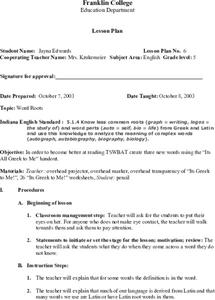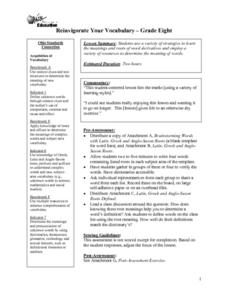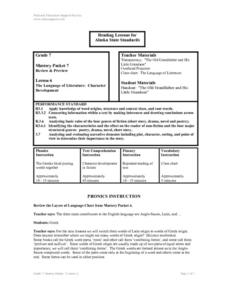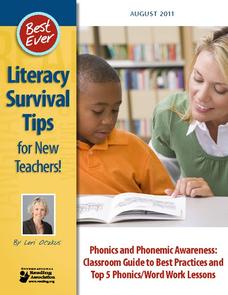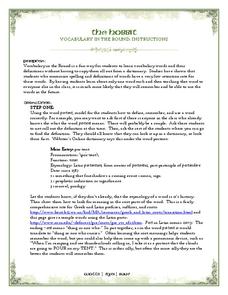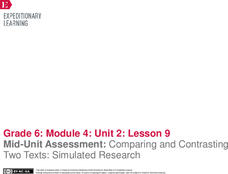Curated OER
Rooting One's Way To Meaning
Students use a thesaurus on the internet to explore the meanings of Greek and Latin roots. They find definitions of given words, draw a concept map for root words, and write four synonyms for each word. Students discover how Latin and...
Curated OER
Rooting One's Way to Meaning
Discover the Virtual Thesaurus with your class. They use the Virtual Thesaurus to assist them in an inquiry-based approach to discovering the meanings of some common Latin and Greek roots. Each child then teaches a particular root and...
Curated OER
Word Roots
Fifth graders discover that for some words, the definition is actually in the word and that much of our language is derived from Latin and many words have Latin roots. They look at the definition part of the worksheet and go over it...
Curated OER
Reinvigorate Your Vocabulary
Eighth graders participate in a variety of activities to examine the meanings and roots of word derivatives and the meanings of words. Using context clues, they determine the meanings of words omitted from a passage and complete a prefix...
Curated OER
Where Do Words Come From?
Students examine the foreign-language roots of various English words. Using the dictionary's word derivation notes and abbreviation key, they develop a list of words with a foreign-language origin, and create a class dictionary.
EngageNY
Mid-Unit 1 Assessment: Human Rights Vocabulary and Common Prefixes
Here is a mid-unit assessment for a group of lessons studying the Universal Declaration of Human Rights (UDHR). The first half of this instructional activity calls for several forms of review. Your class will review the content of the...
EngageNY
Research Tasks: New Words, Relevant Information, Revision
Word builders. Scholars participate in a mini lesson about affixes. They then complete a research vocabulary organizer and share their definitions of the words with the class. They gather more evidence for their research from the...
Curated OER
Greek Origins and Character Development
Seventh graders examine words of Greek origin and discuss character development in fiction. They read a list of Greek word parts and create words on a worksheet. Students then read and discuss an informational handout about character...
Curated OER
Once Upon a Word
Students explore the derivations and usage of common slang terms. Through internet research and discussion, students consider the Latin and Greek roots of contemporary slang terms. Groups complete an etymology chart documenting their...
Curated OER
Greek, Latin and Anglo-Saxon Roots to Better Vocabulary
Seventh graders review the concepts of affixes and roots. They practice common Greek, Latin, and Anglo-Saxon ones which are used to form many words in English. Students develop an awareness of the formation and evolution of words.
EngageNY
Close Reading: The Introduction to the Universal Declaration of Human Rights
As part of a group of lessons, your class will return to the primary text for this unit, the Universal Declaration of Human Rights. Key vocabulary as well as close reading strategies continue to be the focus skills; however, this lesson...
Curated OER
The Star Fisher
What a terrific way to discuss racism in the 1920's. Learners read a story called The Star Fisher by Laurence Yep. It is about a Chinese American girl who experiences racism and prejudice after moving from Ohio to West Virginia....
EngageNY
Summarizing Complex Ideas: Comparing the Original UDHR and the "Plain Language" Version
The eighth lesson plan in this series continues the focus on vocabulary and increasing young readers' awareness of academic language. Pairs of learners participate in a short vocabulary review activity called Interactive Words in which...
Curated OER
Life Science: Living Things
Have your class build their vocabulary bank by studying life science terms. Basic terms like organism, cell, unicellular, and vertebrate are included on the definition sheet provided. Demonstrate how to identify different life science...
Curated OER
Islamic Roots of Judaeo-Christian Culture
Students discuss the stereotypes associated with the major religions of the world. Using primary sources, they summarize the information and role play various roles to the class. They participate in a debate between the different points...
International Reading Association
Literacy Survival Tips for New Teachers!
Whether new to teaching or a seasoned pro, this 12-page phonics and phonemic awareness guide is a must for your curriculum library. Everything from a summary of research on the topic to exercises and activities is included.
Curated OER
Animal Classification
Students are introduced to the concept of classification as it relates to objects, information, and characteristics. In this classification lesson, students research a variety of animals. Students study the Linnaeus's system of...
Curated OER
Linnaeus' Latin Lingo
Students use Latin and Greek words to figure out species names for whales.
Novelinks
The Hobbit: Vocabulary in the Round
Blundering, audacious, obscurest. Class members develop strategies for teaching each other vocabulary words drawn from The Hobbit.
Curated OER
What is in a Name?
Students examine taxonomy and the use of dichotomous keys through two activities. They use a dichotomous key and create one of their own as well as create new scientific Family names for penguins using same word roots used by taxonomists.
Curated OER
Cognate Detectives
Second graders examine how some root words are the same in English and Spanish. They explore cognates in Spanish and English language.
Curated OER
Defining the Difference Between Prokaryotic and Eukaryotic Cells
Young scholars examine microscopic life by conducting a scientific investigation. In this cell analysis lesson, students define the prokaryotic and eukaryotic cells and discuss their word origins. Young scholars view each type of cell on...
Curated OER
Onomatopoeia
Fifth graders investigate onomatopoeia. In this reading lesson, 5th graders create a list of onomatopoeic words from books read and brainstorm words of their own in small groups.
EngageNY
Mid-Unit Assessment: Comparing and Contrasting Two Texts: Simulated Research
Shoo fly. Scholars read DDT Spray Scares Mosquitoes Away, Study Finds and You Think You Have It Tough? to complete a mid-unit assessment. The learners compare and contrast author presentation and conduct a credibility check on each...
Other popular searches
- Latin and Greek Roots
- Vocabulary Greek Latin Roots
- Latin Greek Root Words
- Latin Greek Roots
- Latin and Greek Root Words
- Greek Latin Roots Games
- Latin, Greek Roots
- 8 Greek Latin Roots
- Latin Greek Roots Tree
- Latin & Greek Root Words


